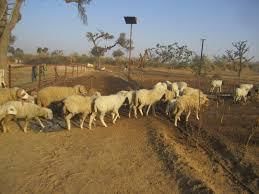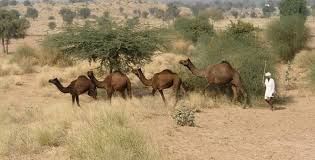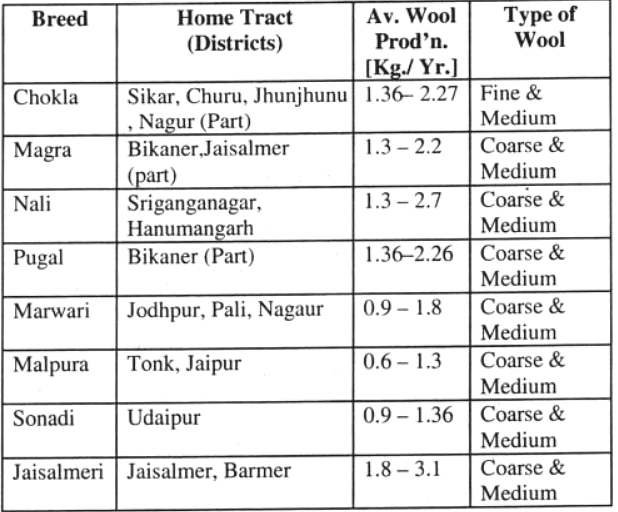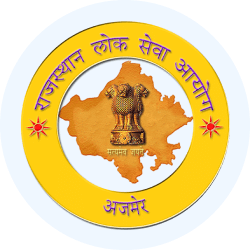Sheep in Rajasthan | RPSC Preparation: All subjects - RPSC RAS (Rajasthan) PDF Download
Introduction
Sheep farming has long been a crucial component of Rajasthan's agricultural and economic landscape. The state reaps significant annual profits from wool, mutton, and other sheep-related products. Due to its cost-effective nature and affordable housing, sheep rearing presents a financially viable opportunity, especially for individuals with limited resources. Flocks in the region typically range from 30 to 400 sheep.

Major Challenges
- Development of Synthetic Fibers: There is a need to explore and utilize synthetic fibers in the production of apparel and carpet wool. This could enhance the quality and variety of wool products available in the market.
- Shrinkage of Pastureland: The reduction in available pastureland poses a significant challenge for sheep farming. This issue necessitates innovative solutions to ensure sustainable grazing areas for the livestock.
- Genetic Potential: The underutilization of the genetic potential of indigenous sheep breeds is a critical concern. Efforts should be made to promote breeding programs that enhance desirable traits and improve overall productivity.
- Technology Absorption: There is a noticeable lack of uptake of available technological advancements within the sheep farming sector. Encouraging the adoption of modern practices can lead to increased efficiency and output.
- Healthcare: Inadequate health coverage for sheep is a pressing issue. Access to veterinary services and disease prevention measures is essential for maintaining healthy flocks and ensuring optimal productivity.
- Marketing and Credit Support: Sheep farmers often face challenges in marketing their products effectively and accessing necessary financial support. Improving marketing strategies and facilitating credit opportunities can boost the economic prospects of the industry.
- Quality Management: Ensuring the quality of sheep, including factors such as health, breeding, and wool production, is crucial for sustaining the profitability and competitiveness of the sector.
Number of Sheep in Rajasthan
- The 20th Livestock Census of India recorded approximately 74.26 million sheep across the country in 2019.
- Rajasthan holds the fourth position in India with around 7.9 million sheep as per the census data.
- Comparing with the 2012 census figure of 9.1 million, there has been a notable 12.95% decrease in sheep numbers in Rajasthan.
Draft Rajasthan State Livestock and Dairy Development Policy, 2019
- The policy emphasizes enhancing nutrition, genetics, breeding strategies, and health services for small ruminants to boost traits like prolificacy, carcass weight, and reduce mortality rates. This aims to elevate the quality and quantity of meat, skin, and wool.
- A state program will involve selecting breeding stocks through extensive screening of farmers' flocks. This initiative is designed to enhance the overall quality of livestock in the state.
- Farmers are urged to form cooperatives or Farmer Producer Organizations (FPOs) to facilitate better access to resources and market opportunities. This collaborative approach can lead to improved efficiency and profitability in the sector.

Sheep Migration in Rajasthan
Migratory patterns are integral to sheep rearing in western Rajasthan. This phenomenon involves seasonal movements of sheep across specific routes.
- Sheep from the southern areas of Jodhpur-Jaisalmer traverse through Bali, Abu Road, Palanpur, reaching river beds in Baroda and Surat for approximately two months.
- Similarly, sheep from the northern regions follow routes via Sawai-Madhopur or Hindaun city, ending at the river banks in Mathura.
- Typically, farmers embark on these journeys during winter, returning home in early monsoon seasons.
- In districts like Churu, Jhunjhunu, and Sikar, flocks exhibit more stability, migrating for shorter durations between home villages and neighboring grazing areas as local pastures deplete.
Different Breeds of Sheep found in Rajasthan
Eight distinct sheep breeds have been identified in Rajasthan. These include:
- Jaisalmeri Sheep
- Origin: Jaisalmer
- Naali Sheep
- Regions: Hanumangarh, Churu, Bikaner, Jhunjhunu
- Characteristics: High wool yield
- Maalpuri Sheep
- Regions: Jaipur, Dausa, Tonk, Karauli, Sawai Madhopur
- Magra Sheep
- Annual Wool Yield: Approximately 2 kg
- Regions: Jaisalmer, Bikaner, Churu, Nagaur
- Pugal Sheep
- Origin: Pugal in Bikaner
- Chokla or Shekhawati Sheep
- Also known as the Marino of India
- Quality: Best quality wool, 1-1.5 kg yield per year
- Sonari or Chanothar Sonadi Sheep
- Regions: Udaipur, Kota
- Adaptability: Thrive in sub-humid and humid areas, resistant to heavy rainfall
- Extend into Gujarat
- Marwari Sheep
- Regions: Jodhpur, Jaipur, parts of Ajmer division

Local Sheep Breeds in Rajasthan, Their Habitat, and Average Yearly Wool Production.
Government Initiatives to Develop Sheep in Rajasthan
Government initiatives in Rajasthan aim to enhance the quality of sheep through various programs and schemes.
- Sheep Breeding Programme
- To enhance the genetic quality of sheep in Rajasthan, the Rajasthan Animal Husbandry Department operates a Sheep Breeding Farm in Fatehpur (Sikar).
- Under the department's sheep breeding policy, indigenous purebred rams such as Chokala, Nali, and Marwari are provided to sheep breeders at a subsidized rate of Rs. 50 per kg live weight.
- In the year 2018-19, the farm disbursed 243 proven rams at reduced costs to sheep breeders.
- The Integrated Wool Development Programme (IWDP)
- The IWDP is a comprehensive program scheduled for implementation over three years, spanning from 2017-18 to 2019-20, across all wool-producing states.
Organizations
- ICAR-CSWRI (Central Sheep and Wool Research Institute):
- The Central Sheep and Wool Research Institute (CSWRI) is a renowned institution under the Indian Council of Agricultural Research (ICAR) that focuses on research and extension activities related to sheep.
- Established in 1962 in Malpura, Rajasthan, the institute's campus is now known as Avikanagar in the Tonk district.
- ICAR-CAZRI (Central Arid Zone Research Institute):
- The Central Arid Zone Research Institute (CAZRI) was founded in 1959 under the Indian Council of Agricultural Research (ICAR), New Delhi.
- CAZRI is actively engaged in sheep research within both farm and rangeland environments.
- Central Wool Development Board, Ministry of Textiles:
- The Central Wool Development Board, operating under the Ministry of Textiles, plays a crucial role in the development and promotion of wool-related activities in the country.
- Animal Husbandry Department, GOR:
- The Animal Husbandry Department was founded in 1958, encompassing Sheep and Wool along with Fisheries sections. In 1984, the Fisheries Department became an independent entity.
- Rajasthan Livestock Development Board
- Formed on March 25, 1998, under the Rajasthan Societies Act 1958, the Rajasthan Livestock Development Board aims to promote livestock development in the state.
|
152 videos|95 docs
|
FAQs on Sheep in Rajasthan - RPSC Preparation: All subjects - RPSC RAS (Rajasthan)
| 1. What are the major challenges faced by the sheep industry in Rajasthan? |  |
| 2. How many sheep are estimated to be in Rajasthan? |  |
| 3. What is the Draft Rajasthan State Livestock and Dairy Development Policy, 2019 about? |  |
| 4. What breeds of sheep can be found in Rajasthan? |  |
| 5. What government initiatives have been taken to develop the sheep industry in Rajasthan? |  |




















